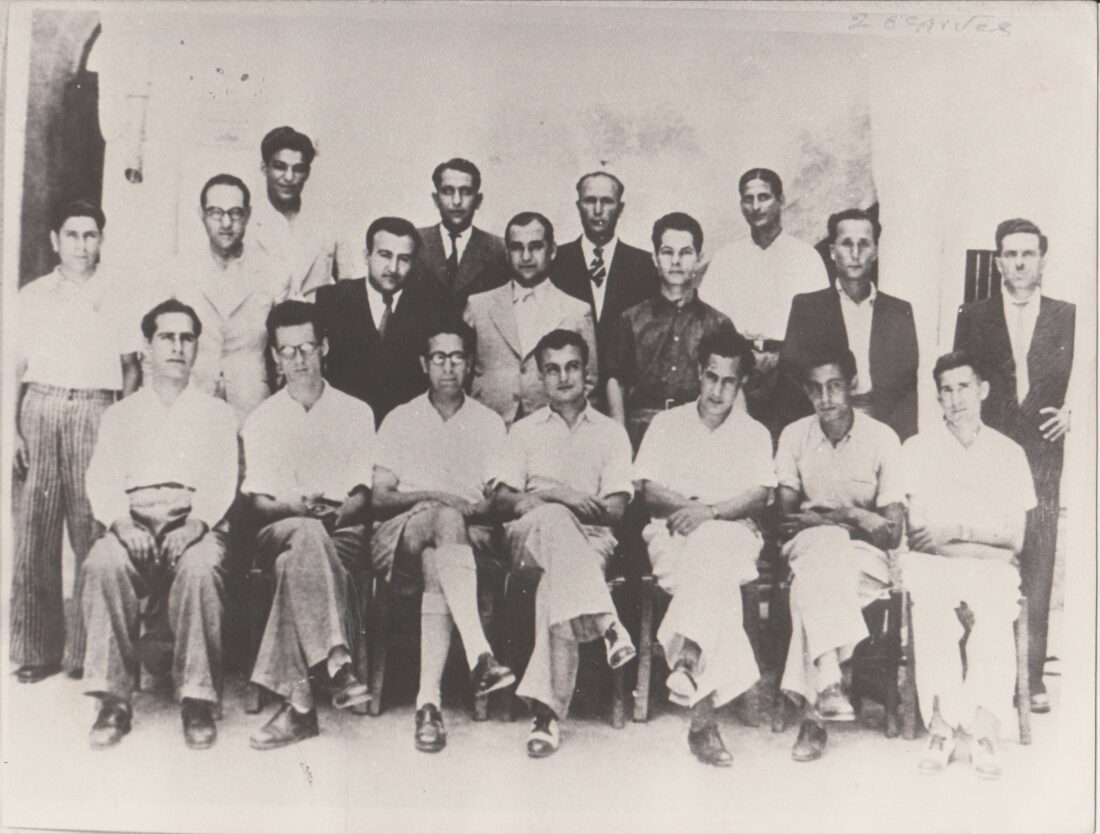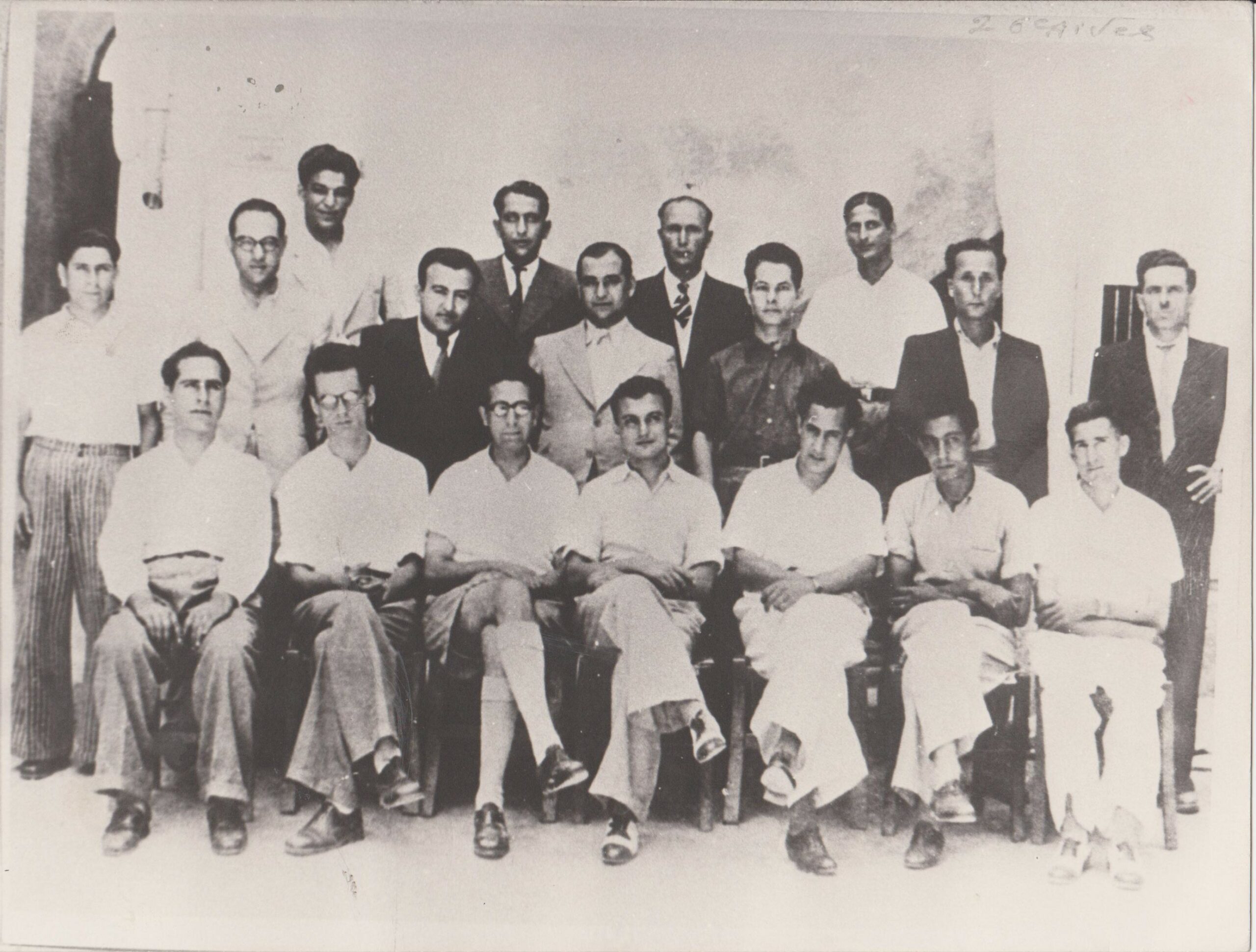
“The trial of the Pancyprian Trade Union Committee” by Yiannakis Colocasides, member of the C.C. of AKEL
90th anniversary Communist Party of Cyprus -AKEL
Sunday 31st January 2016, “Haravgi” newspaper
 On 21st January 1946, exactly 70 years ago, the colonial court found 18 leading militants of the Pancyprian Trade Unions Committee (PTUC) guilty and sentenced them to imprisonment. The same court declared the PTUC illegal. The trial of the PTUC went down in history as one of the biggest political trials of Cyprus, which aimed at crushing the movement of the Left. The class-based trade union movement, AKEL and the broader Peoples Movement of the Left waged a decisive battle, despite the sentence and imprisonment of the trade union militants. They waged this battle opening up new perspectives for the Cypriot Left and the anti-colonial struggle of the Cypriot people.
On 21st January 1946, exactly 70 years ago, the colonial court found 18 leading militants of the Pancyprian Trade Unions Committee (PTUC) guilty and sentenced them to imprisonment. The same court declared the PTUC illegal. The trial of the PTUC went down in history as one of the biggest political trials of Cyprus, which aimed at crushing the movement of the Left. The class-based trade union movement, AKEL and the broader Peoples Movement of the Left waged a decisive battle, despite the sentence and imprisonment of the trade union militants. They waged this battle opening up new perspectives for the Cypriot Left and the anti-colonial struggle of the Cypriot people.
Why did British colonialism, who wanted to appear as supposedly liberal, proceeded to the political trial of the PTUC? Andreas Fantis in his two-volume book on the history of the trade union movement cites three reasons: a) The great influence AKEL had among the Cypriot people, b) the successes of the Left in the 1943 municipal elections, and c) the victorious strike struggles under the leadership of PTUC, first and foremost of the great strike of 1st March 1944. We can perhaps also add the British colonialist’s fear of the development of the anti-colonial struggle.
Police raid
The case of the trial of the PTUC began on the morning of 11th May 1945 with the raids conducted by the colonial police in about 600 offices, branches and associations of PTUC, AKEL and the Peoples Movement in general. A relevant official statement stated that: “Police today conducted searches in the buildings of the Trade Unions and AKEL in all the cities and in many villages. A number of documents were seized, suspected to be of subversive content”.
The People’s Movement responded immediately. It organized mass popular rallies in all the cities that approved protest resolutions. AKEL in a statement issued denounced the raids. It expressed its astonishment why such action took place “just the day after the celebration of the Victory” (Note: over Hitler fascism in the Second World War) and stressed that the police raids are “in absolute contradiction to the purposes of the war and all the talk about freedom and democracy in the Atlantic, Tehran and Crimea declarations.”
On 13th July the colonial government filed a legal suit against the members of the Pancyprian Trade Union Committee and accused them of “conspiring to overthrow the regime.” The accused were Andreas Ziartidis, Antonis Psathas, Stelios Iakovides, Georgos Christophorou, Georgos Christodoulides, Georgos Tembriotis, Takis Fragkofinos, Chrysanthos Savvides, Kyriacos Ragouzaios, Agathangelos Emmanuel, Savvas Ioannou, Michail Xenofontos, Pais Photiou, Hambis Nikolas, Georgos Minas, Kleanthis Sylvestros, Nikos Georgiou and Andreas Tsiaparillas.
The preliminary investigation of the case began on 7th August. On the same day a national strike was held in all the cities of Cyprus. As the newspaper “Independent” writes, “yesterday on the first day of the trial of the Pancyprian Trade Union Committee, workers all over Cyprus went on strike in protest at the trade unions’ trial before the Court.” (“Independent” newspaper, 8/8/1945)
The preliminary investigation referred the defendants to the Assize Court, which met from 17th December 1945 until 21st January 1946. As of 19th December the accused trade union leaders were detained in the Central Prison.
In the Crown Court on behalf of the Crown (!) appeared the Attorney General St. Pavlidis and Kr. Tornaritis as public prosecutor. The accused were defended by a group of lawyers including Ioannis Clerides, Georgos Ladas, Giagkos Potamitis and others.
Ideological and political trial
The Pancyprian Trade Union Committee never hid its ideological identity or its relationship with AKEL, nor its political objectives which were the assertion of the right of the Cypriot people to self-determination aiming at Enosis.
Most days of the trial were spent in the reading of documents of the PTUC by the prosecutors, which as they claimed were seditious in content. The “Independent” newspaper, which was following the trail on a daily basis and covered it with extensive reports, documented some of the “incriminating” sentences found in the trade union documents seized. Here are just a few examples: “Our country must rely its freedom on the shoulders of the honest working class”, “The liberation of our country lies in our own hands”, “They are trying to drug the People”, “Beware of the government’s blatant provocations and deal with them prudently”, “Our Party’s efforts for uniting all popular forces against the occupier”, “Lefkoniko[1] will remind us of the national slavery and oppression”, “The problems of the people cannot be solved under an imperialist administration”, “Our struggle should be combined with our national issue”, “Only through our National Liberation will we achieve the solution of our economic problems.”
The Attorney General in his opening speech gave the anti-AKEL and anti-communist tone of that trial. Among other things, he said the following: “It is very sad that the trade union movement is guided by people who instead of guiding workers on the correct road, are trying to lead the masses on the path of conspiracy and revolution. The main purpose of this organization is to overthrow the existing regime and establish a socialist state, by revolution, based on Marxist theory. The defendants do not cease to ask a Party to guide them. This must be a Party, which is based on the Marxist proletarian type; the accused did not hesitate to proclaim that this party should be AKEL.” (“Independent” newspaper, 12/18/1945).
Also very interesting is the dialogue between the public prosecutor Kr. Tornaritis and judge Zannetidi: The judge asks: “Is Marxist theory an offense?” And Tornaritis replied: “In accordance with Cypriot law, indeed it is.” The judge continues: “Is the possession of Marxist books a punishable act?” Tornaritis replied: “Yes. I mean again in Cyprus. In encouraging the teachings of Marx they are propagating the struggle between the different social classes of the Colony, in so doing causing unrest and aiming at the overthrow of the regime by revolution.” (“Independent” newspaper, 1/15/1946).
It is obvious that in the trial of the Pancyprian Trade Union Committee AKEL and its ideology was also on trial. Besides, the militants of the PTUC were also militants of AKEL. As the historian Rolandos Katsiaounis revealed, bringing to light documents of that period, Nicosia and London were considering outlawing AKEL.
In his final speech the defence attorney Ioannis Clerides said, inter alia, that: “The accused denounce the capitalist system that allows the exploitation of man by man and which during the war … allowed some people to accumulate wealth by exploiting the families of soldiers and the workers in the rear. The accused are seeking to change this regime … Their views are not their own invention, but the view of great social philosophers and economists. The defendants never conspired, never concealed their goals and principles. On the contrary, they took steps to convey them widely to the people.” (“Independent” newspaper, 1/11/1946)
Judgment and reactions
The colonial court, consisting of a Turkish Cypriot judge and two Greek Cypriot judges, found the accused guilty. Before the sentences were passed, they were asked to apologize. The General Secretary of PTUC Andreas Ziartidis who spoke on behalf of everyone sentenced, among other things, declared: “All the activity for which we have been accused of and for which this Court finds us guilty … is fully in line with the noble principles, which have been set as the objectives of the war, which ended just a few months ago. We are not to blame if we believe in these principles. We do not regret what we have done because this is what every honest human being would do the same… If the court rules that it is obliged to punish us then it is not us who are being punished, but those principles which we have previously mentioned.” (“Independent” newspaper, 1/22/1946)
Twelve of the leaders of the Panyprian Trade Union Committee were sentenced to 18 months imprisonment and the remainder to one year in prison. The PTUC itself was declared illegal and prohibited. On the evening of 21st January when the sentences were announced mass popular meetings were organized in all the towns of Cyprus. On 22nd January mass protest rallies were held. AKEL and the trade unions internationalized the issue. A debate was even provoked in the House of Commons in Britain. As a result of the popular mobilization and the international outcry, the colonial governor ordered the release of all the imprisoned militants on the completion of 1 year in prison.
The Cypriot people, especially the workers, supported by every means the leadership of the PTUC. Among other things, a fundraising campaign was organized to cover the costs of the court proceedings. As in so many other cases the organizations of the Right-wing (SEK and KEK) and the Right-wing newspapers were absent, who openly or indirectly sided with the colonialists in their attacks on the trade union movement of the Left.
On 30th and 31st March 1946, the Fourth Pancyprian Trade Unionist Conference decided to establish the Pancyprian Federation of Labour PEO. The attempt of the British colonialists to smash the class-based trade union movement came to nothing.
Sources: “Independent” newspaper, “The History of PTUC-PEO”, “The trade union movement in the years of British rule,” A. Fantis
[1] * Refers to the bloody events on 25th March 1945 in the village of Lefkoniko in the Famagusta district when the Left organized a demonstration. Police opened fire and three people were shot dead.




